#1 crypto NFT wallet
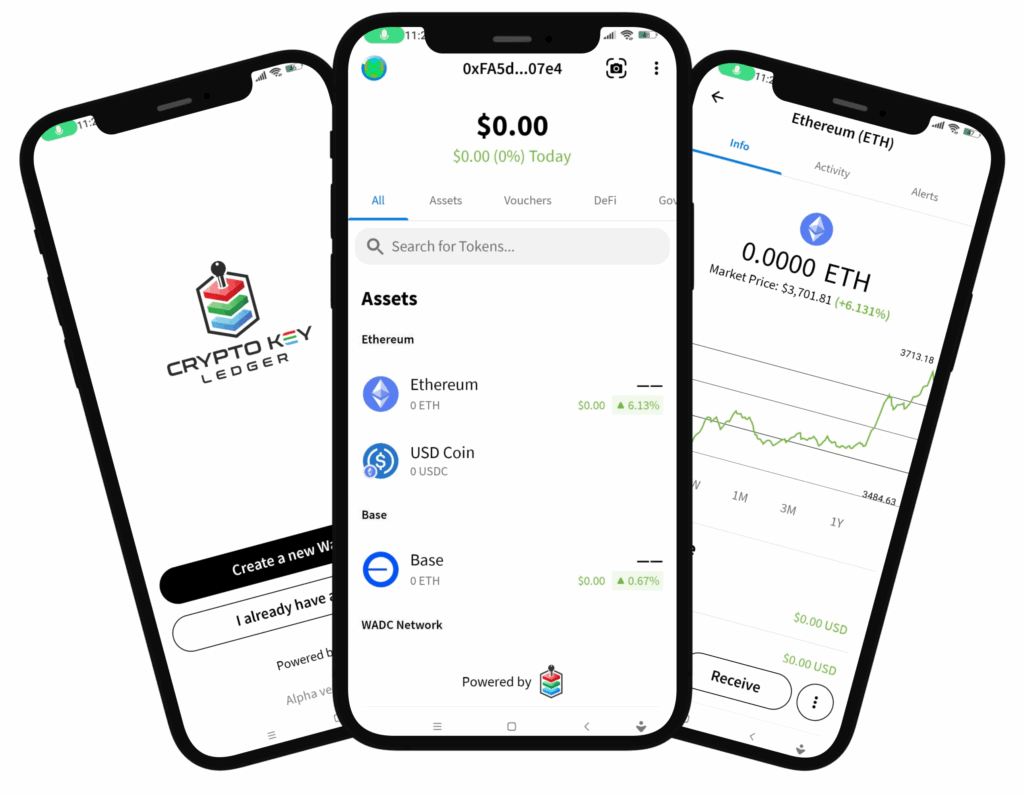
The most advanced NFT white labeled wallet with your company’s branding & digital vouchers.
The CryptoKeyLedger white label allows your customers to use your digital vouchers all from a simple to use digital wallet all with your company’s branding.
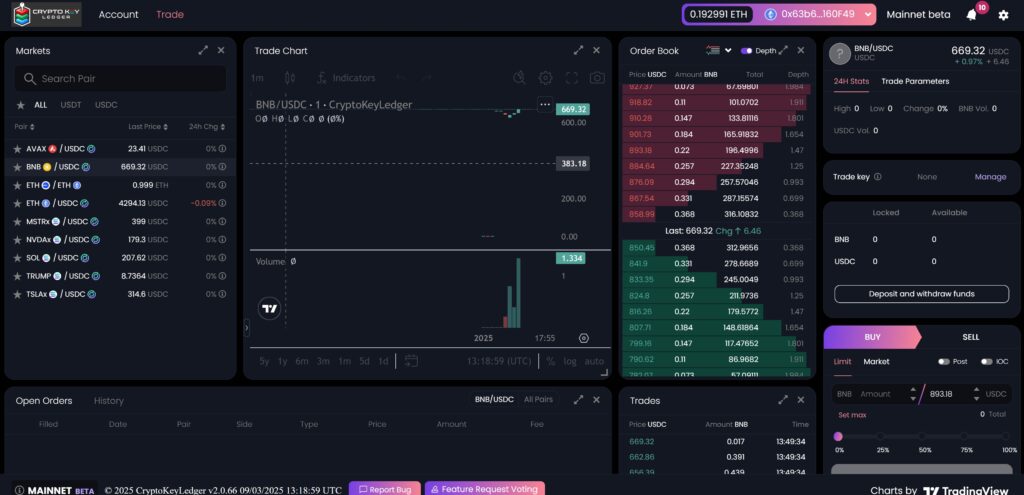
CKL Industry Verticles
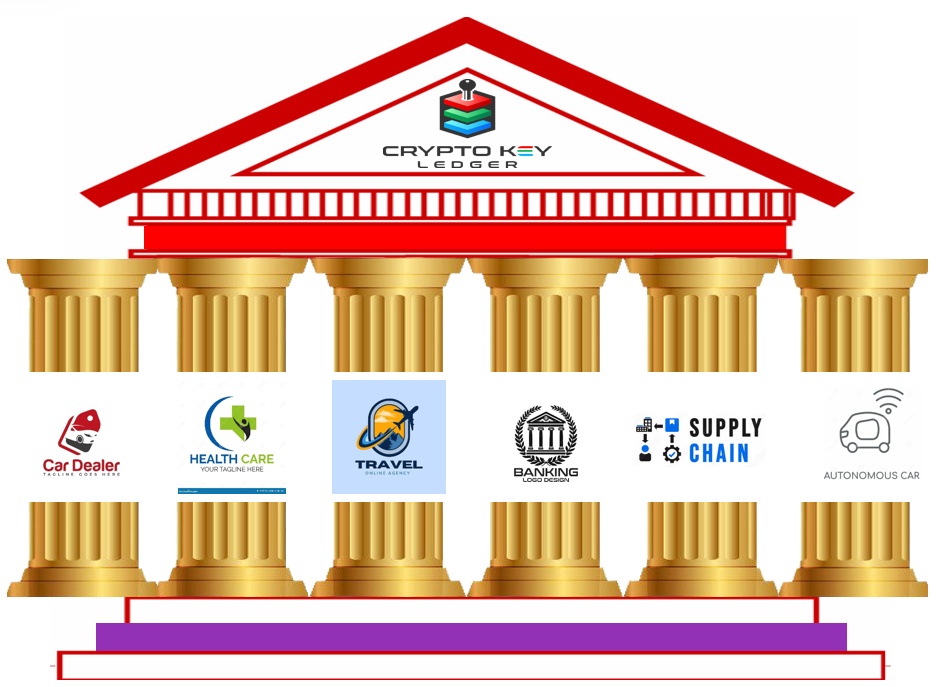
CKL has been a leader in bringing blockchain & crypto to several industry verticals. Contact us to see how your business can benefit from a partnership.
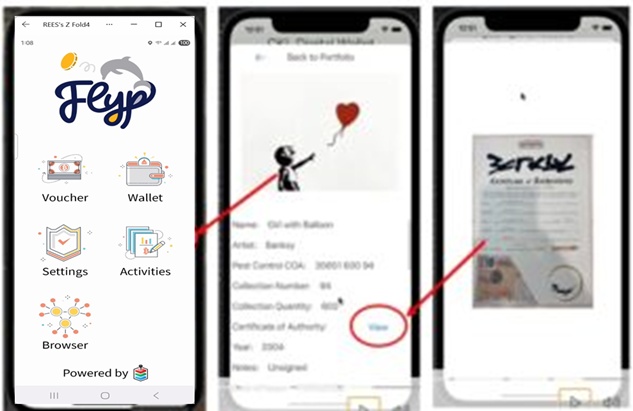
With CKL patented features a token with artwork can have a button that shows the Certificate of Authenticity.
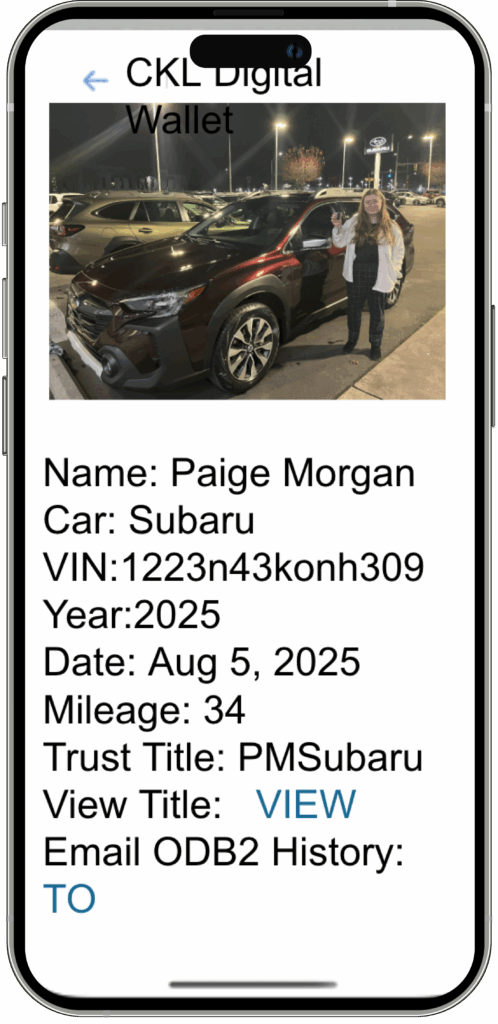
Patented token represents your ownership of a car.

Patented token represents a doctors appointment.
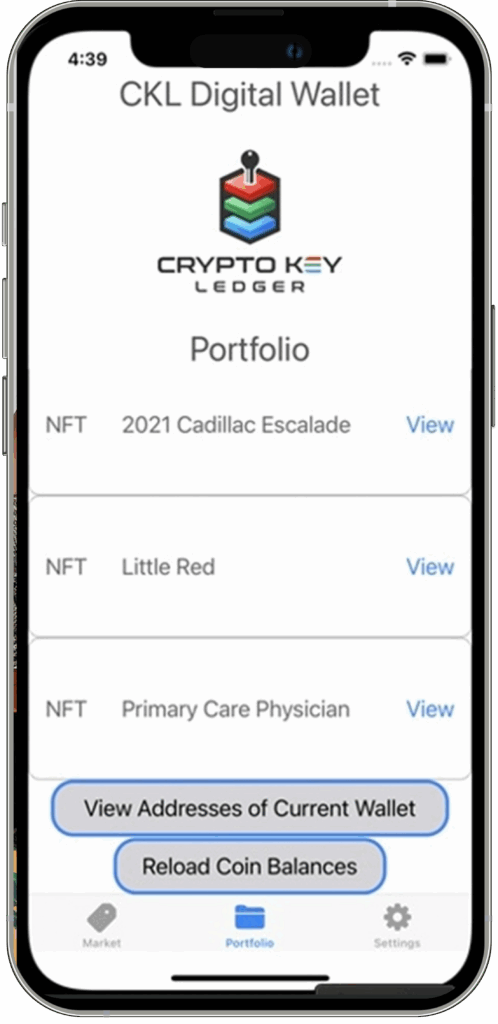
Patented NFT features that only CKL wallet has.
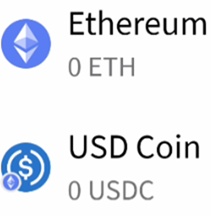
Crypto your clients can pay for product.
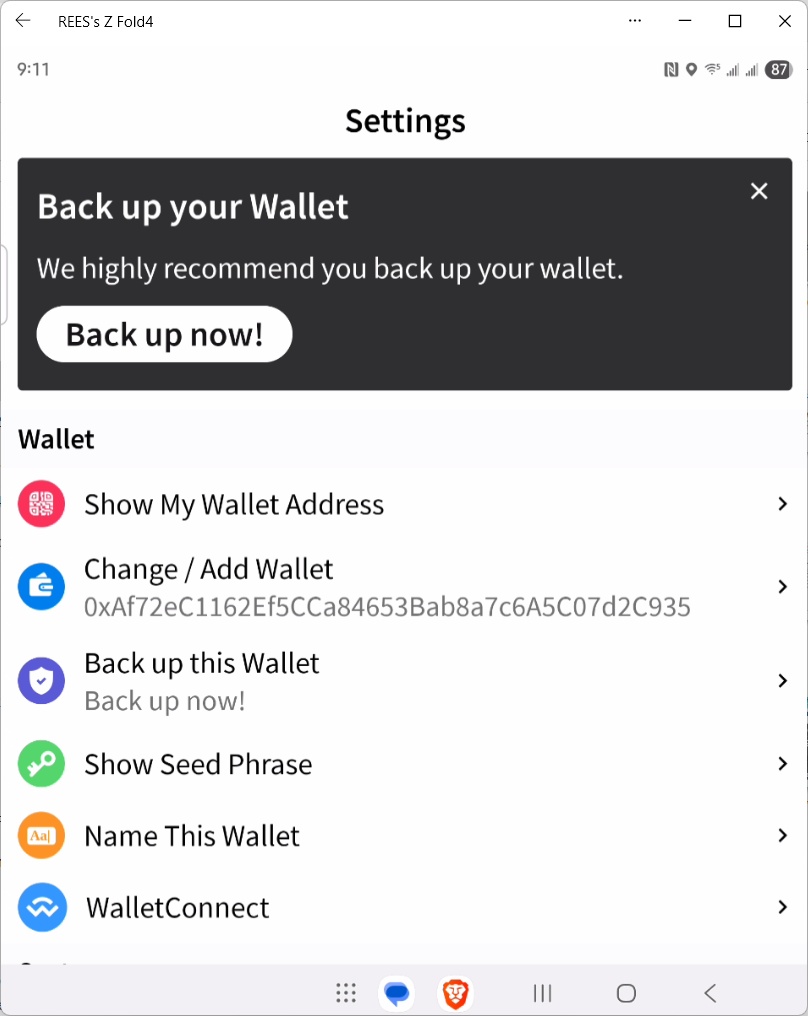
Easy access to settings
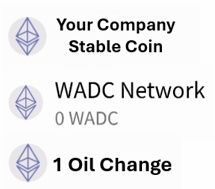
Your clients will have your company's digital vouchers in your branded wallet.
Crypto is now mainstream.
At this year’s Bitcoin 2025 in Las Vegas in May Vice President JD Vance announced that the US plans to lead the world in crypto. The 15+ years of a negative narrative is over.

Key benefits of the best new NFT wallet
The CryptoKeyLedger Wallet lets you store your private keys on your phone while maintaining easy access to them.

Our wallet has been designed to be used by users new to digital wallets.

Security has been designed all throughout the wallet.

Our wallet is a Non-Custodial DeFi wallet. Your keys, your crypto.

Our wallet has its own section for your company's Digital Vouchers. It also comes with 35 of the most popular Ethereum coins. Additional 1,000+ coins can easily be added.

Throughout the wallet ease of use and security have been designed into each feature.

The wallet has a Tab for internet browsing extending the wallet out to your company's website.

Users can buy the most popular Ethereum coins from within the wallet using a credit card.
CKLs Wallet allow your customers to not only see your company’s digital vouchers in one easy place along with 35+ leading blockchains coins. Users can add 1,oos of additional coins simply and easily.
Recovery words
As a non-custodial Defi wallet, CryptoKeyLedger leverages a 12-word recovery phrase that empowers users with full control over their assets. These recovery words allows wallet contents to be restored in the event of device loss, damage, or application removal.
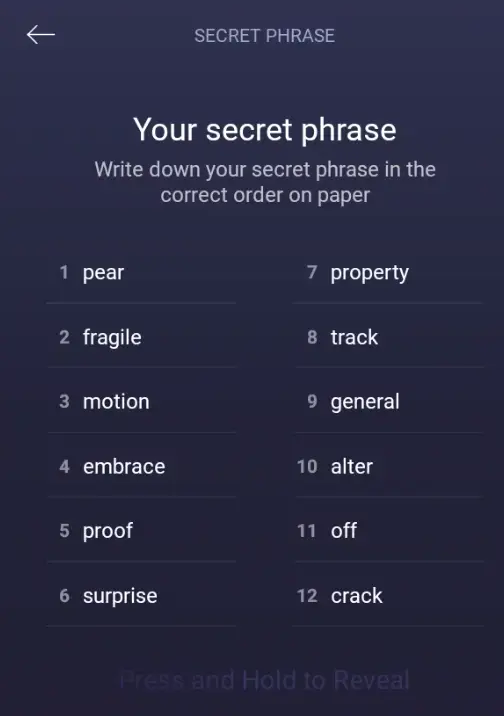
Frequently asked questions
The CryptoKeyLedger Wallet lets you store your private keys on your phone while maintaining easy access to them.
The CKL Wallet is designed with simplicity and ease-of-use in mind, making it an ideal entry point for customers new to digital assets. For many users, it may serve as their first experience managing a cryptocurrency wallet.
After becoming familiar with digital currencies via the CKL Wallet, customers may choose to explore other platforms, such as Coinbase, for managing assets like Bitcoin. However, they will continue to rely on your company’s CKL Wallet to access proprietary digital vouchers and interact with Ethereum-based assets.
CKL Wallet offers advanced functionality for Ethereum tokens, making it the preferred tool for engaging with your ecosystem.
Blockchain technology is a way of recording and verifying data that’s transparent, secure, and decentralized. At its core, it’s like a digital ledger—but instead of being kept in one place (like a bank database), it’s shared across a network of computers. Here’s how it works and why it’s revolutionary:
📚 The Basics of Blockchain
- Blocks: Each block contains a group of transactions or data entries.
- Chain: Blocks are linked together in chronological order, forming a permanent chain.
- Decentralization: No single entity controls the data. Everyone on the network has access to the same version of the truth.
- Immutability: Once data is recorded in a block, it’s extremely difficult to change. That makes fraud nearly impossible.
- Consensus Mechanisms: The network uses rules like Proof-of-Work or Proof-of-Stake to agree on what data gets added.
🔐 Why Blockchain Is Trusted
- Transparency: Anyone can audit the data.
- Security: Cryptographic principles protect the integrity of transactions.
- Trustless: You don’t need to trust a central authority—just the math and the code.
🚀 Beyond Bitcoin
While it started with Bitcoin, blockchain now powers:
- Smart contracts: Agreements that automatically execute when conditions are met (think escrow, but automatic).
- NFTs: Unique digital assets tied to ownership records.
- Supply chain tracking: Provenance and authenticity checks for goods.
- DeFi: Financial services without banks—lending, borrowing, and trading on-chain.
Bitcoin is a decentralized digital currency—meaning it doesn’t rely on banks, governments, or any central authority. Instead, it runs on a peer-to-peer network powered by thousands of computers across the globe. Here’s how it works at a glance:
🔍 Key Concepts Behind Bitcoin
- Digital & Decentralized: No physical coins or notes. Transactions happen over the internet and are recorded on a public ledger called the blockchain.
- Limited Supply: Only 21 million Bitcoin will ever exist. This scarcity makes it more like digital gold than a traditional currency.
- Proof-of-Work: New Bitcoin is created through mining—solving complex math problems to validate transactions and secure the network.
- Pseudonymous Transactions: Every transaction is recorded, but tied to wallet addresses, not real names.
💡 Why People Use or Hold Bitcoin
- Store of value: Like gold, many see it as a hedge against inflation and economic uncertainty.
- Global money: No need for currency exchanges or wire fees—it’s borderless.
- Innovation: It’s inspired new technologies and ecosystems, including the Lightning Network for fast payments and stablecoins for less volatility.
Bitcoin’s true revolution isn’t just technical—it’s philosophical. It asks: What if money could be free from centralized control?
Bitcoin was created by a person—or perhaps a group—using the pseudonym Satoshi Nakamoto. What makes it fascinating is that, despite its global influence, the true identity behind Satoshi remains a mystery to this day.
🧩 What We Know About Satoshi Nakamoto:
- First appeared in 2008 by publishing the Bitcoin white paper: “Bitcoin: A Peer-to-Peer Electronic Cash System”.
- Launched the Bitcoin network in January 2009 by mining the first block—known as the Genesis Block—which even contains a hidden message referencing a UK newspaper headline about bank bailouts.
- Communicated primarily through emails and forum posts, maintaining a strong emphasis on decentralization.
- Disappeared in 2011, leaving behind a self-sustaining project and a cryptic legacy.
🤔 Theories About Satoshi’s Identity:
- Some speculate it’s a single cryptographer or developer; others suggest it might be a collective of experts from academia, finance, or government.
- A few individuals have claimed to be Satoshi, but none have provided conclusive cryptographic proof (like signing a message with Satoshi’s known private keys).
Bitcoin’s origin story adds an air of mystery and myth to its already revolutionary design.
Cryptocurrency is digital money designed for secure, decentralized transactions without needing a traditional bank or payment processor. It lives on blockchain networks and uses cryptography to verify and record transactions. Think of it as programmable money that you can send or receive anytime, anywhere—without middlemen.
🔑 Core Features of Cryptocurrency
- Decentralization: No central authority. It’s governed by code and consensus across a network of users.
- Blockchain-based: Every transaction is recorded on a public, tamper-resistant ledger.
- Cryptographic security: Complex algorithms protect wallets and verify transactions.
- Global and borderless: Send funds instantly across countries with minimal fees.
- Digital ownership: You control your funds with private keys—no bank accounts required.
⚙️ Popular Cryptocurrencies
| Name | Ticker | Primary Use | Notes |
|---|---|---|---|
| Bitcoin | BTC | Store of value / digital gold | First and most well-known |
| Ethereum | ETH | Smart contracts / decentralized apps | Powers much of the Web3 ecosystem |
| USDT / USDC | Stablecoins pegged to USD | Used for low-volatility payments | |
| Solana | SOL | Scalable smart contracts | Known for fast, low-cost transfers |
💼 Real-World Applications
- Payments: Buy goods/services directly or integrate into business workflows (like OpenNode).
- Smart contracts: Automatic agreements for finance, gaming, or logistics.
- DeFi: Decentralized finance platforms that allow lending, borrowing, and yield generation.
- Digital identity and ownership: NFTs and wallet-based credentials.
Cryptocurrency isn’t just “internet money”—it’s a rethinking of how value is stored, transferred, and managed. Want to dive into how payment workflows differ between Lightning Network and traditional bank rails, or explore wallet types beyond Sparrow?
CryptoKeyLedger wallet is like your personal gateway to the blockchain—it lets you send, receive, and store cryptocurrencies securely. But instead of holding actual “coins,” it stores the private keys that grant access to your digital assets. Let’s break it down:
🛠️ Core Components of CryptoKeyLedger Wallet
- Public Key: Like your wallet’s address. You can share it with others to receive funds.
- Private Key: A secret code that unlocks access to your funds. You must keep it safe—anyone with this key can spend your crypto.
- Wallet Interface: A UI to interact with the blockchain. This could be an app, browser extension, or even command-line tool.
🧰 Types of Crypto Wallets
| Wallet Type | Description | Security Level |
|---|---|---|
| Hardware Wallet | Physical device (e.g., Ledger, Trezor) | 🔒 Very High |
| Software Wallet | App or program (e.g., Sparrow Wallet) | 🔐 Moderate |
| Web Wallet | Browser-based wallets (e.g., MetaMask) | ⚠️ Lower (if hosted) |
| Paper Wallet | Printed or handwritten private key | 📜 Depends on storage |
Non-custodial wallets like Sparrow give you full control—no middlemen. Custodial wallets (like those on exchanges) handle keys for you but can restrict access.
🔁 How Transactions Work
- You enter a recipient’s public key (address).
- Your wallet signs the transaction with your private key.
- The network verifies and records it on the blockchain.
- Voila—funds sent!
It’s like having your own encrypted vault, connected to a public register. Want a visual of how private/public key pairs work or a walkthrough of Sparrow Wallet’s transaction flow?
The first time you launch a CKL wallet you will go the Create Wallet or Import Wallet. You are not required to write down the 12 recovery words. They will be created and available to be copied and stored safely.
Bringing the crypto market place to
your business.
The CKL Wallet is designed with simplicity and ease-of-use in mind, making it an ideal entry point for customers new to digital assets. For many users, it may serve as their first experience managing a cryptocurrency wallet.
After becoming familiar with digital currencies via the CKL Wallet, customers may choose to explore other platforms, such as Coinbase, for managing assets like Bitcoin. However, they will continue to rely on your company’s CKL Wallet to access proprietary digital vouchers and interact with Ethereum-based assets.
CKL Wallet offers advanced functionality for Ethereum tokens, making it the preferred tool for engaging with your ecosystem.